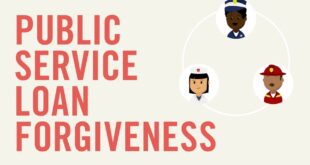You can qualify for free government programs to get student loan forgiveness that may seem like a scam.
Below are details about existing loan forgiveness programs. But, you can’t participate in federal repayment programs if you have private loans.
Federal Forgiveness programs
These options are only available to borrowers with federal student loans. Some programs have strict criteria that make them difficult to qualify for, but income-driven repayment plans are available to most borrowers.
- Income-driven: With the four income-driven repayment plans offered by the federal government, you can cap the amount you pay each month on your loans. These plans allow borrowers with large loan balances relative to their incomes to forgive their loan balances. The plan may allow for loan forgiveness after 20 or 25 years, depending on the plan. As part of the March 2021 American Rescue Plan, only 32 borrowers have experienced the freedom of tax-free forgiveness through income-driven repayment forgiveness. The American Rescue Plan made the tax-free forgiveness retroactive to December 2020 through the end of 2025. For many borrowers, income-driven repayment would be too late to qualify for forgiveness by the early 2030s.
- Public Service: Federal Student Loan Forgiveness is available to government and qualifying nonprofit employees with federal student loans. Eligible borrowers can have their remaining loan balance forgiven tax-free after making 120 qualifying loan payments. To qualify for PSLF, you must be enrolled in an income-driven repayment plan. In other words, with a standard repayment plan, the loan would have to be paid off first before you could be eligible for forgiveness. As of November 2020, only 2% of borrowers had been granted forgiveness.
- Teacher Loan: The Teacher Loan Forgiveness program is available to teachers who work full-time in low-income public elementary and secondary schools for five consecutive years. They may be eligible for forgiveness of up to $17,500 in federal direct or Stafford loans. To qualify, teachers must have taken out loans after Oct. 1, 1998.
- For nurses: The NURSE Corps Loan Repayment Program covers up to 85% of qualified nurses’ unpaid student loans. Nursing students with student debt have several options for loan forgiveness. Nurses may find Public Service Loan Forgiveness to be the best option – few borrowers have Perkins loans, and the NURSE Corps program is highly competitive.
- Obama student loan: Obama student loan forgiveness does not exist. However, some student “debt relief” companies use the term to refer to free federal programs. Those programs are usually not free but they charge for enrollment. Consider it a red flag if a company offers “Obama student loan forgiveness”. You can enroll in federal student loan consolidation programs and income-based repayment programs on your own by contacting the Department of Education.
Other student loans forgiveness programs
Some other federal and state programs may provide forgiveness or payment assistance in the form of forgiveness of student loans. Your eligibility for these programs depends on where and how you work.
- State-sponsored programs: Some states offer debt repayment assistance programs for teachers, nurses, doctors, and lawyers. As an example, Mississippi’s Teacher Loan Repayment Program pays up to $3,000 per year for a maximum of four years on undergraduate education loans to teachers with specific teaching licenses for each year of teaching full time in a particular geographical location. You can find out if you qualify for a program by contacting your state’s higher education department.
- Military: You may be eligible for your own lender’s loan forgiveness program if you’re in the Army, Navy, Air Force, National Guard, or Coast Guard. Soldiers and officers who qualify can receive up to $50,000 to pay off their federal student loans through the Student Loan Repayment Program.
- LRAPs: Various national and international programs may assist public service professionals in repaying their student loans. As an example, the National Institutes of Health offers up to $35,000 in debt assistance to health professionals appointed by the institutes to conduct research. List of state LRAPs for lawyers.
Perkins student loan cancellation programs
The Federal Perkins Loan Program allows borrowers to have up to 100% of their loans canceled if they work in the public sector for five years. Most often, approved borrowers will see a percentage of their loans discharged incrementally for each year worked. Perkins loans are offered to teachers working full time at low-income public schools or teaching subjects like special education, math, science, or foreign languages.
Discharge programs
- Closed school: If your school closes, you may be eligible for a loan discharge. To qualify, you must have been enrolled or have left within 120 days without receiving a degree. If you qualify, contact your loan servicer to begin the application process. You must continue making payments on your loan during the application process. When you get approved, you may not have to make any further loan payments and receive some or all of the past loan payments refunded to your account.
- Repayment discharge: Colleges may be able to offer debt relief to borrowers who have been defrauded. If you want to defend yourself against repayment, you’ll need to file with the U.S. Department of Education. At the discretion of the Education Department, your loans may automatically be discharged if your school engaged in clear, widespread fraud or misrepresentation that affected a broad group of borrowers.
- Permanent disability: It may be possible to have your remaining student loan debt canceled if you are totally and permanently disabled, mentally or physically. You’ll need to prove your disability to qualify. Once your loans have been discharged, the government may monitor your finances and disability for three years. Your loans may be reinstated if you don’t meet requirements during the monitoring period. Details on how to apply are available at disabilitydischarge.com.
- Due to death: A death certificate will discharge your federal loans upon your death. A parent who holds a PLUS loan for you or you may die, leaving the loan discharged.
Caution: Through the Department of Education, forgiveness, cancellation, and discharge programs are free. However, there are other fees to take into account.
Conclusion
Before you can apply for forgiveness, you’ll need to consolidate or rehab defaulted federal student loans. The student loan settlement or bankruptcy program may be able to reduce your debt if your loans aren’t eligible for forgiveness. Defaulted federal loans may qualify for discharge programs.
 Student loan Forgiveness Call us immediately
Student loan Forgiveness Call us immediately



